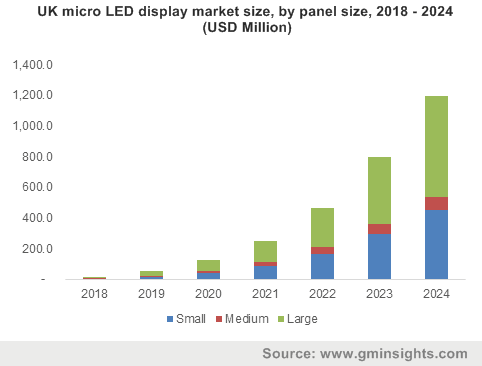MicroLED display market to register a mammoth CAGR of 115% over 2018-2024, rising demand for smartwatch to boost the industry expansion
Publisher : Fractovia | Published Date : 2018-08-02Request Sample
With the world making continuous strides in advancement of modern technologies, the microLED display market has proliferated from several consumer and commercial applications, where innovations in display equipment warranty uninterrupted demand. Consisting of tiny LED arrays with each microLED operating as a pixel, modules are becoming smaller resulting in better, brighter image quality and much improved response time in displays. Being increasingly substituted for primitive display technology, the microLED display industry has also allowed for power saving in applications where large-size panels used excessive energy to communicate information. In an era when flexibility and ease of adaptability are considered to be paramount features for long-term survival of any technology, the ability to be integrated into small as well as large display equipment depending on use has accentuated the global micro-LED display market growth.
UK micro LED display market size, by panel size, 2018 - 2024 (USD Million)

Rising number of miniaturized electronic products has inspired manufactures to develop small size panels incorporating the microLED technology, since an improved display not only signifies a product’s quality but also is safer for a consumer’s eyes. As such, adoption of the technology in daily encountered display devices such as screens, signages, near-to-eye devices, HMDs and automotive lights will enormously benefit the microLED display market. Compared to OLED or other display technologies, the brighter microLEDs do not lose their luster due to natural aging over time, maintaining the quality of picture and brightness whereas OLEDs manufactured at the same time start to fade. Placing of individual parabolic mirrors behind LEDs causes all of the light to be reflected towards the viewer, resulting in a very high brightness capability and makes the microLEDs more power efficient. Owing to the long-life and highly-efficient characteristic, the microLED display industry is gradually being embraced by the booming smartwatch segment.
The explosion of smartwatches across global markets is a direct result of the smartphone frenzy that has garnered the devotion of billions of consumers. A report estimates that within the next three years itself the sale of smartwatches could surpass 80 million units, showcasing the growth potential of the microLED display market. A smartwatch is designed to perform numerous functions, ranging from displaying time & messages, picking up phone calls to GPS tracking, measure heart rates and other health factors. Having the need to communicate all this information throughout the day while consuming less energy to last a whole day, the smartwatches segment is an ideal consumer market for powerful and long-lasting small micro-LED display panels. The tremendous opportunities for the micro LED display market can be surmised by looking at the sales figures of smartphone giant Apple, which reportedly sold 8 million Apple watches in the fourth quarter of 2017.
Expounding further, Apple recently announced that it shipped out around 3.5 million smart watches in the second quarter of 2018, leading the smartwatch segment and the company is investing heavily in using the micro-LED technology in it’s smart watches. Fossil, which is primarily into analog and chronograph watches had ventured into the smartwatch domain and reported improved sales of USD 300 million from wearable devices. With a host of other players like Fitbit, Garmin, Xiaomi and Samsung looking to introduce better smartwatch products, and other near-to-eye display devices like AR/VR headsets gaining popularity at an immense rate, the small microLED display market is anticipated to witness an incredible CAGR of over 105% from 2018 to 2024. The progress of the large micro LED display market has also been extraordinary, ensuing from significant advancements achieved in developing innovative display panels that can fit together to create big screens or signages.
To elaborate, in early 2018 Samsung unveiled its new 146-inch screen, termed as The Wall, which is a microLED modular TV, consisting of several 9.37-inch display modules. At the same time, Lumens, another Korean company also revealed its 139-inch and 130-inch signages, made of large-size microLED displays. With businesses worldwide depending on effective marketing channels to convert their investment into profits, billboards and public signages are a prominent solution to market all kinds of products. Digital signages can be built depending on outdoor or indoor use, and LED panels can easily be added or removed to adjust the sizes. With closely placed fine pitched LED panels, high resolution images and videos can be displayed to consumer and directly affect sales of displayed products.
Overall, the microLED display market is driven by continuous innovations, for instance the recent collaboration of the Industrial Technology Research Institute (ITRI) of Taiwan with Unimicron, Macroblock and PlayNitride for producing ultra-fine pitch microLED signage modules by 2019. Introduction of commercially viable products by dominant industry players, including Samsung, Apple, Epistar, Lumens, Innolux, LG, Oculus VR, ALLOS Semiconductors and VueReal, will critically expand the micro-LED display market in the ensuing years.